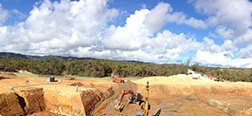Environmental Due Diligence (EDD)
Due diligence (DD) is a term used to describe research on investment targets in M&A (mergers and acquisitions). Due means ‘of course’, and diligence means ‘effort’, so DD can be interpreted as the obligation to make an effort before an investment decision is concluded. DD is generally carried out by individual specialists in each field, including finance, legal affairs, human resources and the environment.

Scenes where EDD is required
EDD properly evaluates the environmental risks of a target site (e.g., soil contamination, exhaust, wastewater, legal compliance, etc.) and makes decisions and pricing recommendations for M&A and real estate transactions (relocation / withdrawal of overseas production bases, etc.). It can also be used for collateral evaluations by financial institutions and for examining corporate real estate strategies.
EnBio provides cross-border EDD even when M&A transactions span multiple locations in Japan and overseas, and in parallel with environmental evaluations. Occupational, Health and Safety (OHS) aspects also can be evaluated. We consider the scope of the investigation according to the situation, and provide EDD according to the target country and region, period, restrictions, etc. for each project.

Criteria for Survey
In the case of environmental surveys targeting overseas locations, it has been common in the past to apply US standards (ASTM E1527: Phase 1 Environmental Site Assessment), mutatis mutandis. That was fine in an era when few countries had clear rules about environmental regulations, but in recent years, due to the growing sense of global environmental awareness, the number of countries and regions that have enacted their own laws and regulations has increased. Today, there are more items than ever to be confirmed after understanding the local rules. EnBio has a network of local partners in a wide range of countries and regions and carries out optimal surveys in consideration of local legal compliance standards. For countries and regions other than those listed below, please feel free to contact us, as we can flexibly respond to each project according to your research needs.

UK, Italy, Netherlands, Spain, Germany, France, Belgium, Portugal, Russia, India, Indonesia, Cambodia, Singapore, Thailand, Korea, China, Taiwan, Hong Kong, Pakistan, Bangladesh, Philippines, Vietnam, Malaysia, Myanmar, Laos, Australia, US, Canada, Argentina, Uruguay, Colombia, Chile, Paraguay, Brazil, Peru, Mexico, etc.
Main Overseas EDD Achievements
| Country | Implementation contents | |
|---|---|---|
| Malaysia | Phase 1 Investigation | |
| Phase 1 & 2 Investigations | ||
| Singapore | Phase 1 Investigation | |
| Phase 1 & 2 Investigations | ||
| Thailand | Desktop Study | |
| Phase 1 Investigation | ||
| Australia | Phase 1 Investigation | |
| France | Desktop Study | |
| Germany | Desktop Study | |
| US | Guam | Desktop Study |
| Phase 1 Investigation | ||
| Northern Mariana Islands | Desktop Study | |
| Phase 1 Investigation | ||
| New York State | Desktop Study | |
| North Carolina State | Desktop Study | |
| Texas State | Desktop Study | |
| Canada | Desktop Study | |
| China | Hebei Province | Evaluate environmental legal compliance |
| Henan Province | Phase 1 & 2 Investigations cost calculation for Phase 3 |
|
| Jiangsu Province | Phase 1 Investigation Evaluate overall environmental risks |
|
| Desktop Study | ||
| Shanghai City | Desktop Study | |
| Zhejiang Province | Phase 1 & 2 Investigations | |
| Phase 1 & 2 Investigations Cost calculation for Phase 3 Evaluate overall environmental risks |
||
| Guangdong Province | Phase 1 Investigation Evaluate overall environmental and production regulatory risks |
|
| Desktop Study | ||
| Taiwan | Desktop Study | |
| Korea | Desktop Study | |
| Desktop Study | ||
Q&A
- Is it possible to order a report in English?
- Our reports are based on English text and a Japanese summary, with the assumption that they will be read by people from multiple countries. We can respond flexibly according to your language needs.
- Is it possible to make an evaluation without conducting a field survey?
- Especially for overseas cases, it is recommended that we assess the actual situation through site visits, but depending on restrictions on transactions, an evaluation by written correspondence only, or an evaluation by written correspondence + Q&A is also possible.
- Can EnBio handle environmental DD other than factories?
- We are able to evaluate sites such as farms and commercial buildings by proposing a survey scope that is tailored to the conditions and constraints of the site.
- Can you give me a second opinion on another company's survey?
- It is possible to evaluate an EDD report that has already been implemented. Please see below for details.
Evaluations of EDD reports
We are happy to evaluate EDD reports that have already been implemented. We check and evaluate EDD reports led by a selling company or local corporation, through we will also work to confirm and evaluate the information that can be read and its supporting documentation, to verify if the prior evaluation of environmental and operational risks was appropriate. A report evaluation allows you to organise information such as how you judge past surveys, the need for additional surveys and what points to check as the deal progresses.

- We have evaluated that the conclusion ‘it is unlikely that it causes significant soil / groundwater pollution from ...’ is generally valid.。
- The possible risks of potential soil and groundwater contamination, and the major risks identified for environmental management, are as follows. From the viewpoint of continuing the factory’s operations, there is a serious risk involved.
The target land is located near the XX dam. This dam is used to collect drinking water and is designated as a drinking water source protection area under the Water Quality Environmental Pollution Control Law. Any emissions of wastewater, including domestic wastewater, are prohibited. According to the EDD report, the wastewater generated on the premises is used as XX after its secondary treatment, but there is no description of the total amount generated.
Further, although it was mentioned in the report that ‘...the target land may be out of the water source protected area’, this information could not be confirmed in interviews with local environmental consultants, announcements by XX, etc. These efforts have not yet dispelled doubts about tightening regulations.
These concerns need to be addressed carefully during site visits.











